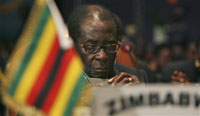China opposes to US sanctions against Zimbabwe
U.S. Secretary of State Condoleezza Rice urged China on Monday to back U.N. Security Council action to punish Zimbabwe's leaders, saying the time for mere statements was over. But Beijing showed little sign of being prepared to support upcoming U.S. proposals.

Speaking to reporters traveling with her in Beijing, Rice noted progress in stripping North Korea of its nuclear programs and urged China to sincerely engage Tibet's exiled Buddhist leader, the Dalai Lama.
Rice also called on Beijing to unshackle the Internet and said she had raised several individual cases of detained activists.
Chinese officials have offered little to prompt optimism in Washington for planned tough new action over Zimbabwe, a Chinese ally and trading partner in Africa.
Rice said Washington agrees with China that African nations need to play a bigger role, but said additional action is needed.
"We'd like the Africans to take the lead but it is not an African issue alone. It is also an issue for the Security Council," she said. "When we go to the U.N. we're going to need something that is not just another statement."
China holds a veto in the Security Council and its backing, along with that of Russia, will be essential to any move to penalize President Robert Mugabe and his top aides for allegedly instigating political violence.
The White House wants to impose an international arms embargo on Zimbabwe and place travel bans on Mugabe and his cronies. But after meeting Rice, Chinese Foreign Minister Yang Jiechi said Beijing favors negotiations between Mugabe, who was sworn in for a new term Sunday, and the opposition.
"The most pressing path is to stabilize the situation in Zimbabwe," Yang said at a news conference with Rice on Sunday. "We hope the parties concerned can engage in serious dialogue to find a proper solution."
Rice says the U.S. plans to introduce a resolution in the council this week. The U.S. holds the council's presidency until July 1, but appears to face an uphill battle in getting several important members to agree to any penalties against Zimbabwe.
Rice said she raised the issue again with Chinese President Hu Jintao and Premier Wen Jiabao on Monday.
But while both men thanked Rice for U.S. assistance after the May 12 earthquake in China's southwest Sichuan province that killed nearly 70,000 people, they failed to mention Zimbabwe in comments before talks with her.
On other topics, Rice said the leaders discussed progress in the six-nation talks hosted by China that aim to permanently disable Pyongyang's nuclear programs.
North Korea last week handed over a long-delayed declaration of its programs and facilities and blew up the cooling tower at its main reactor site. In exchange, Washington has lifted some economic sanctions against the North and said it would remove the country from a U.S. State Department list of state sponsors of terrorism.
"We are all encouraged, but everybody emphasizes the hard work ahead," Rice said. "We really have to get to a phase that is devoted to abandonment."
Rice said she was encouraged by word of a new round of talks this week between China and envoys of the Dalai Lama. The discussions seek a long-term resolution of problems in the Himalayan territory, ruled by Beijing with an iron fist since communist troops invaded more than half a century ago.
"We think he's a very positive figure in dealing with the very difficult issue of Tibet," Rice said.
Rice declined to say what human rights cases she raised, but said Washington was concerned about the arrest of several bloggers for writing about sensitive political issues on the Internet.
After Monday's meetings, the secretary boarded her jet for the flight home to Washington. China was Rice's final stop on a weeklong tour that also took her to Germany, Japan and South Korea.
Subscribe to Pravda.Ru Telegram channel, Facebook, RSS!

